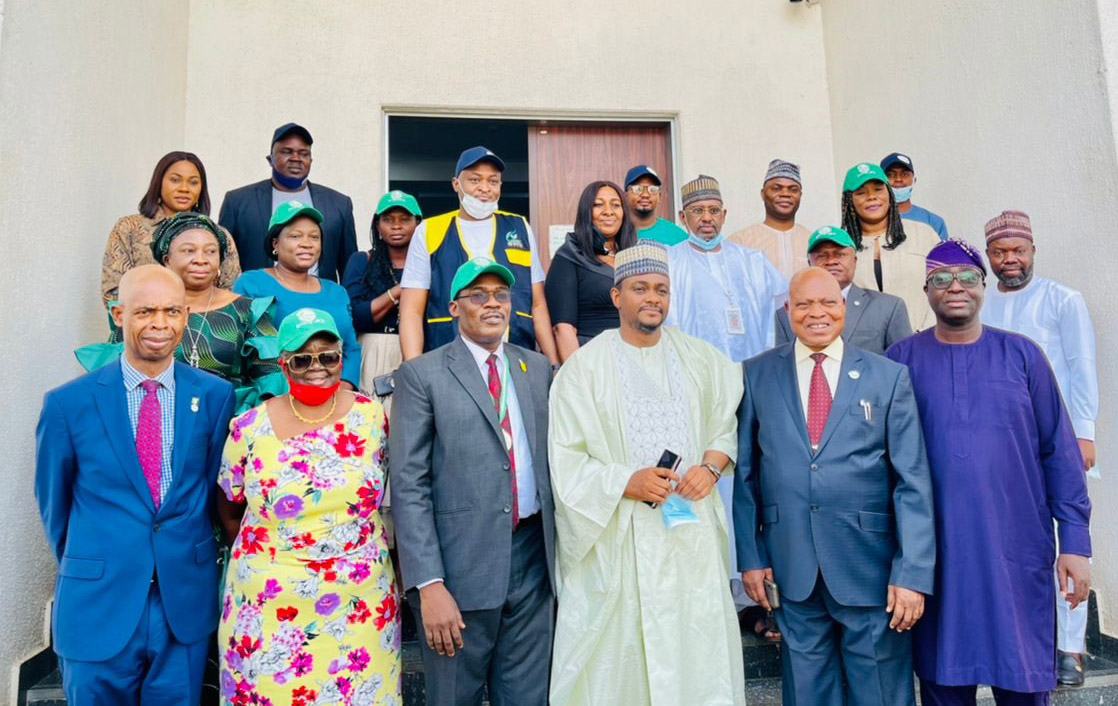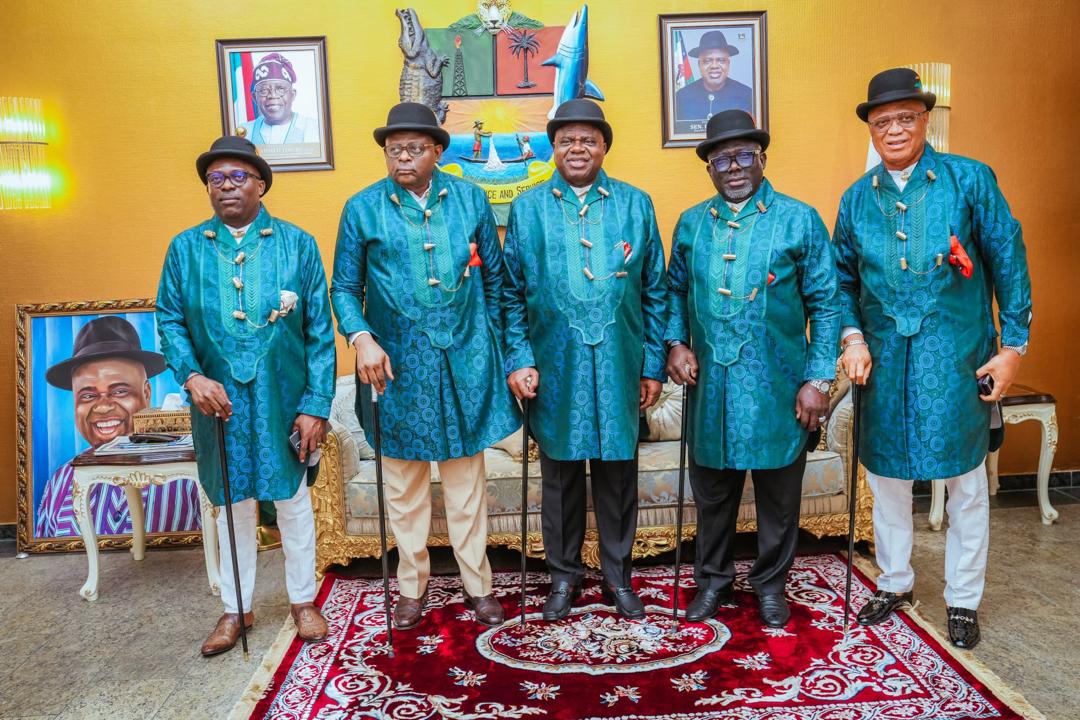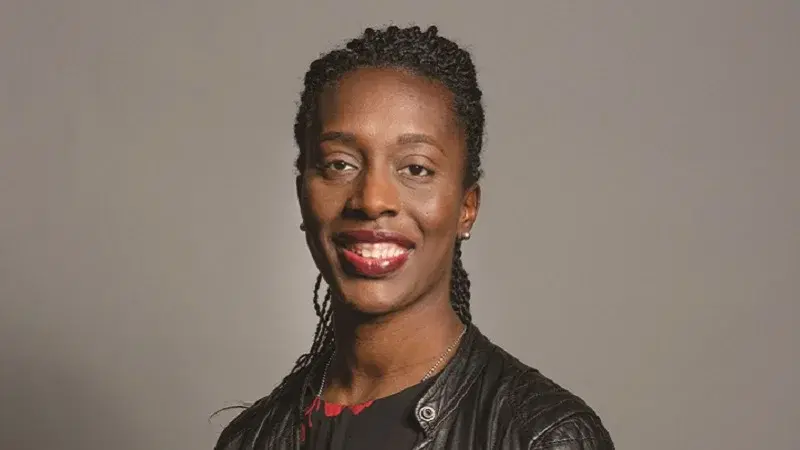News
FG Targets $70bn Waterways, Multi-Modal Transport Networks Revenue

The Federal Government has concluded plans to replicate United States’ model to generate about $70billion revenue from its waterways and multi-modal transportation networks and create thousands of jobs in the country.
Part of the plans to achieve this was the unveiling of the navigational charts of the lower River Niger from Lokoja in Kogi State to Burutu in Delta State by the Minister of Transportation, Mu’azu Jaji Sambo.
The Navigational charts cover 594 km (321 Nautical Miles) with a total survey area of 1719.8 Square Kilometers.
The minister, who spoke at the NAF Conference Centre in Abuja, said the project was in tandem with the statutory responsibilities and objectives of the Federal Ministry of Transportation.
He said the project would boost the efforts of the President Muhammadu Buhari-led Federal Government towards the development and operation of an efficient and safe Inland Waterways Transportation Network.
“A well-developed and efficient Inland Water Transportation is necessary for an integrated and functional multi–modal transportation system, whose major pillar is dependent upon accurate and timely hydrographic surveys/charts.
“The objective of this project is to provide direct maritime linkages within Nigeria and between African countries, thereby catalyzing Nigeria’s Gross Domestic Product (GDP) growth, attracting Foreign Direct Investments (FDI), creating highly needed jobs, and boosting internal as well as intra – African trade,” he said.
The minister said that the US economy today is supported by revenues of over $70billion from 600million tons of cargo transported through its inland waterways, creating hundreds of thousands of jobs, building and growing Agro-industrial communities along the waterway channels and thus spreading economic prosperity throughout the length and breadth of its waterways network.
According to him, the USA’s waterways and multi-modal transportation network provides a competitive edge in global markets.
“No wonder, its corn and soybean farmers are the most efficient in the world!”, he said.
Sambo said that Nigeria is blessed with an 800km coastline and over 10,000km of inland waterways that potentially confers it with such maritime power that in itself alone, can transform the country into a great and prosperous place on earth!
He also affirmed the Federal Ministry of Transportation’s commitment to the successful attainment of the overall objective of the Navigational Charts Project in line with President Muhammadu Buhari’s vision for the holistic and sustainable development of the maritime sector and the Inland Waterways in particular.
He commended the laudable initiative of Sealink Promotional Company Limited with funding from the NEXIM and African Export–Import Bank, the Nigerian Navy and the National Inland Waterways Authority (NIWA), who jointly conducted the survey exercise, an effort never before undertaken in the history of our country.
“On this note, I want to specifically express my gratitude and that of the ministry to the Managing Directors of NEXIM Bank and AfriExim Bank for providing the necessary funds for the execution of this Project, the Chief of the Naval Staff and the Managing Director, National Inland Waterways Authority for their collaborative efforts that ensured the successful execution of this project, and I look forward to more of this effort to extend the Hydrographic Survey of Inland Waterways nationwide
“While congratulating all critical stakeholders on this auspicious unveiling, please rest assured of our continued commitment and support,” he said.
News
Let’s Approach Regional Development Issues Differently – Fubara …As S’South Govs Host Fubara To 50th Birthday Celebration

Rivers State Governor, Sir Siminalayi Fubara, has sued for a change in the current approach adopted by South South Governors in their pursuit to achieve holistic regional development and economic prosperity.
The governor insisted on de-emphasis in vested individuals’ political interests while looking at the bigger picture of achieving enduring regional integration that will strengthen unity of purpose to change the trajectory of development in the region.
Fubara made the appeal during the meeting of Governors of South-South States, under the auspices of BRACED Commission, at the Bayelsa State Government House in Yanagoa on Tuesday.
This was contained in a statement by the Chief Press Secretary to the Governor, Nelson Chukwudi.
BRACED is an acronym for Bayelsa, Rivers, Akwa Ibom, Cross River, Edo and Delta.
He said: “I want to appeal that if we have to succeed in this drive, we need to keep our political differences aside and understand that the struggle, as at today, is for posterity, for the development of our region.
“It is really sad that in Niger Delta that is the economic base of this country, the construction of a road that you tagged ‘East-West Road’ could be an issue, that we need to beg, protest, and complain to get it fixed. I don’t think it is proper.”
Governor Fubara stated that it is not that the federal authorities do not understand that Niger Delta needs the road but quickly added that they have seen that even the people of the region do not take themselves seriously.
The governor said the moment Niger Delta people stopped playing to the gallery, and place value on themselves, outsiders will have no option than to accord the region and its people due regard.
Fubara said: “On my part, I want to say this: This is not the first time we are meeting. For me, I followed the course of the region meeting in a forum that we tagged “BRACED Commission.”
“BRACED Commission is also one of the bodies that was constituted at that time to support and work out development strategies for this region. But what I am seeing today is just limiting this meeting to only BRACED COMMISSION.
“We need to widen the scope where other leaders of the region should be part of the discussion of the development of the region, and I think this is the direction that will help the region.”
Reading the Communique of the meeting, the new Chairman of the Forum of Governors of South-South States, and Governor of Bayelsa State, Senator Douye Diri, said they support the Federal Government Tax Reform Bills, and urged President Bola Tinubu to extend the Value Added Tax (VAT) sharing percentages to oil and gas derivation.
He stated the Forum’s request to the Federal Government to urge relevant stakeholders and agencies to extend remediation of polluted environment ongoing in Ogoni land to other impacted communities and States in the region.
Governor Diri also said that the Forum resolved to establish a structural regional security network to enhance safety and security, foster stable Niger Delta region conducive for economic growth and prosperity.
Highlight of the event was the hosting of Governor Fubara to a surprise 50th Birthday celebration by the Governors of South-South States at the Government House in Yenagoa.
News
Fubara Lauds Tinubu For Setting Up Education Load Fund … Vows To Ensure Rivers Benefit Maximally From Scheme

The Rivers State Government has applauded President Ahmed Bola Tinubu for conceiving the idea of setting up the Nigeria Education Loan Fund (NELFUND) which has opened up opportunities for youths to acquire tertiary education irrespective of their financial status.
Rivers State Governor, Sir Siminalayi Fubara, gave the commendation while playing host to a delegation from NELFUND who came on an advocacy visit to the Government House in Port Harcourt on Tuesday.
Represented by his deputy, Prof. Ngozi Nma Odu, Governor Fubara said in developed countries it is common for people to go through school with loans which they sometimes pay all throughout their lives, noting that “for us, it is more accessible and more friendly because you would be required to pay back the loan two years after your National Youth Service.
“It is a win-win situation; it is a situation where the youths in Nigeria should not say because my parents are poor or passed away I cannot improve on my educational growth. This offers them a golden opportunity and I am glad you came for this advocacy.”
The governor urged NELFUND to intensify its advocacy to let the people know how they can benefit from it, adding that it is more important when talking about vocational institutions.
“If you look at the developed countries it is people that went to the vocational schools that make so much money, because it is pricey to get somebody to do anything, we need to instil this into our people, our youths, because people sometimes tend to look down on people that went to vocational schools, it should not be,” he said.
Fubara expressed delight with the NELFUND programme and assured that the State Government would do whatever it can to ensure Rivers State benefits maximally from the scheme.
In his remarks, the Managing Director and Chief Executive of NELFUND, Dr. Akintunde Sawyer, informed the governor that they were in Rivers State to seek the support of the State Government towards the loan, stressing that President Tinubu has directed them to ensure no Nigerian student who has the ability and desire to get educated at tertiary level is denied the opportunity due to lack of funding.
He explained that the scheme provides interest-free loans to students who apply, adding that these loans are not repayable until two years after their Youth Service when they must have gotten a job.
News
UK Appoints British-Nigerian As Trade Envoy To Nigeria

A British-Nigerian politician, Florence Eshalomi, has been appointed as the United Kingdom’s trade envoy to Nigeria.
Her appointment makes Eshalomi the second Nigerian to hold the position.
Confirming her appointment on X on Tuesday, she wrote: “It is an honour to have been appointed as the United Kingdom’s Trade Envoy to Nigeria.
“I’m looking forward to building on my close ties with Nigeria to promote a strong and flourishing economic relationship between our two great nations.
“I am looking forward to strengthening the UK’s relationship with Nigeria to explore shared growth and opportunities for both countries.”
Announcing the appointment in a statement on Tuesday, Jonathan Reynolds, the UK’s Business and Trade Secretary, said the decision was aimed at attracting investment into the UK and boosting economic growth.
“I’ve launched a new team of trade envoys who will use their experience, expertise, and knowledge to unlock new markets around the world for British businesses, attract investment into the UK, and ultimately drive economic growth,” Reynolds said.
Eshalomi, 44, is an MP representing the Vauxhall and Camberwell Green constituency.
She holds a Bachelor of Arts (Hons) in Political and International Studies with Law from Middlesex University.
-
Business3 days ago
NNPC Plans Mini NLNG Projects For Outside Pipeline Network Customers
-
Politics19 hours ago
Celebrate Patriotic Citizens, Not Corrupt Politicians, Babalola Tells FG, States
-
Business15 hours ago
FG Assures On Releasing Illegal Air Charter Report
-
News3 days ago
Nigeria Customs Honours 21 Personnel For Diligence In Duty
-
News21 hours ago
Security: PCRC Holds Street Walk For Fubara, Lauds Gov @50
-
Opinion17 hours ago
Rivers Politics: Lere Olayinka’s Cocktail Of Lies
-
Business3 days ago
Nigeria Wants Higher Quota From OPEC
-
News19 hours ago
#EndBadGovernance Protesters Storm Court, Demand Sowore’s Release

